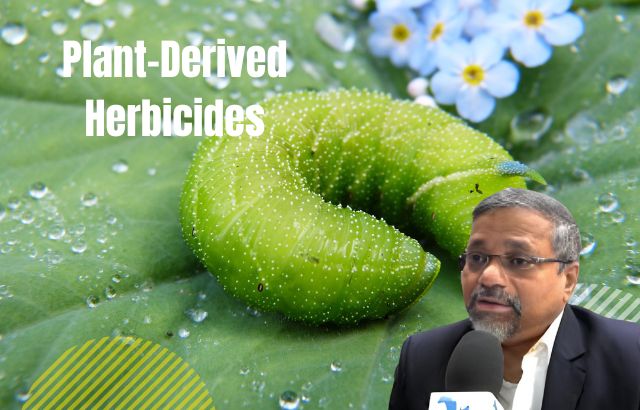In the world of green innovation, Jaiguru Kadam has emerged as a notable figure, pushing the boundaries of sustainable agriculture through his work on plant-derived herbicides, also known as green herbicides or bioherbicides. As the demand for eco-friendly solutions in agriculture grows, Kadam’s research and developments stand at the intersection of nature and technology, creating herbicides that are safer for the environment, human health, and wildlife.
Herbicides have been a staple in modern agriculture for decades, helping farmers control weeds and maximize crop yield. However, conventional chemical herbicides often come with significant drawbacks, including harmful effects on soil health, water contamination, and negative impacts on biodiversity. This is where Jaiguru Kadam’s innovations come into play, offering a more sustainable alternative.
The Role of Jaiguru Kadam in Green Herbicides

Kadam’s work is focused on the development and commercialization of bioherbicides, which are natural herbicides derived from plant-based compounds, microorganisms, or naturally occurring substances. Unlike their synthetic counterparts, plant-derived herbicides offer a more environmentally friendly and sustainable solution to weed management in agriculture.
Research and Development of Bioherbicides
Jaiguru Kadam has dedicated his career to exploring the potential of plant-based and biologically sourced herbicides. His work is groundbreaking in several ways:
- Harnessing the Power of Plants
One of Kadam’s key contributions is identifying specific plant species that contain potent natural compounds capable of inhibiting weed growth. These plant-derived chemicals can act as bioherbicides that are both effective and biodegradable, meaning they break down naturally in the environment without leaving harmful residues.For instance, Kadam has worked on isolating plant molecules that have allelopathic properties, which means these plants can suppress the growth of other competing plants (weeds). By extracting these compounds and concentrating them, Kadam has been able to create herbicidal formulations that target only undesirable plants while preserving the surrounding ecosystem. - Development of Green Herbicide Products
Kadam’s innovation doesn’t stop at the research phase—he has taken these natural herbicidal compounds and developed them into practical, market-ready products. These green herbicides are increasingly gaining attention in organic farming, sustainable agriculture, and eco-friendly gardening sectors due to their non-toxic nature and lower environmental impact. - Reducing Dependency on Synthetic Chemicals
The widespread use of chemical herbicides has led to numerous problems, including resistance in weed populations and damage to beneficial insects, pollinators, and soil microorganisms. Kadam’s green herbicides offer a way to reduce dependency on synthetic chemicals and provide farmers with more sustainable, effective alternatives that do not harm the environment. - Regenerative Agriculture
Kadam’s work aligns with the principles of regenerative agriculture, which focuses on restoring soil health, enhancing biodiversity, and reducing the carbon footprint of farming. By utilizing bioherbicides, farmers can minimize the disruption of natural ecosystems, improve soil quality, and reduce chemical runoff into waterways.
Examples of Plant-Derived Herbicides

Several plant-based herbicides have shown promise in Kadam’s research, and many have already been commercialized or are in the process of being tested in various agricultural systems. Here are a few examples:
- Allelopathic Compounds
Plants like mustard and sunflower release chemicals that naturally inhibit the growth of surrounding weeds. These chemicals, known as phytochemicals, are being extracted and formulated into bioherbicides. Jaiguru Kadam’s research in this area involves isolating and refining these phytochemicals to create highly effective and environmentally safe herbicidal products. - Essential Oils
Kadam has also explored the potential of essential oils—such as those from clove, cinnamon, and garlic—which have demonstrated herbicidal properties. These oils are rich in volatile compounds that can disrupt weed cell membranes, leading to dehydration and eventual death of the plant. As natural and biodegradable products, essential oil-based herbicides are gaining attention as viable alternatives to chemical herbicides. - Plant-Derived Fatty Acids and Saponins
Fatty acids, like those derived from soybean and corn, as well as saponins (naturally occurring surfactants found in plants like quinoa and alfalfa), have shown promising herbicidal activity. These compounds are effective in controlling a wide range of weeds without causing harm to the soil or surrounding crops.
Benefits of Bioherbicides Developed by Jaiguru Kadam
Jaiguru Kadam’s work with bioherbicides offers a host of benefits to farmers, the environment, and society as a whole:
- Eco-Friendly and Non-Toxic
Bioherbicides derived from plants are much less harmful to the environment than traditional chemical herbicides. They are biodegradable, meaning they break down quickly in the soil without leaving toxic residues. This helps protect water sources, soil quality, and biodiversity. - Targeted Action
Plant-derived herbicides tend to be more selective, targeting specific weed species without damaging other plants or crops. This selectivity allows farmers to manage weeds effectively while preserving the health of their crops and the surrounding ecosystem. - Reduction in Resistance
The overuse of chemical herbicides has led to the emergence of herbicide-resistant weeds. By using natural herbicides derived from plants or microorganisms, the risk of resistance is greatly reduced. Additionally, many bioherbicides are effective at low doses, further decreasing the potential for resistance. - Sustainability and Soil Health
Kadam’s bioherbicides are designed to promote sustainability by enhancing soil health. Unlike chemical herbicides that can disrupt beneficial soil microorganisms, plant-derived herbicides are often more compatible with natural soil ecosystems, supporting the health and diversity of soil organisms. - Support for Organic and Regenerative Farming
Bioherbicides are an ideal solution for organic farming practices, which prohibit the use of synthetic chemicals. These natural alternatives enable organic farmers to control weeds effectively while staying true to the principles of sustainability and environmental stewardship.
Jaiguru Kadam’s Impact on the Green Herbicide Market

Kadam’s pioneering work has not only contributed to the advancement of bioherbicide technology but has also helped shape the future of sustainable agriculture. By leveraging plant science and biotechnology, he has made it possible for farmers to adopt more eco-friendly practices that align with global sustainability goals. As the agricultural industry continues to face challenges related to environmental degradation, pesticide resistance, and food security, Kadam’s innovations provide a hopeful path forward.
His contributions are significant for several reasons:
- Empowering Farmers: By developing plant-based herbicides, Kadam has given farmers the tools to manage weeds effectively without harming the environment or risking human health.
- Advancing Green Chemistry: Kadam’s work exemplifies how the future of herbicides can be aligned with green chemistry principles—utilizing renewable, natural resources to solve agricultural problems in a sustainable manner.
- Inspiring Global Change: As more countries and regions adopt sustainable agricultural practices, Jaiguru Kadam’s bioherbicides have the potential to revolutionize weed management on a global scale, contributing to the fight against climate change and promoting a healthier planet.
Conclusion
Jaiguru Kadam’s role as a green innovator in plant-derived herbicides represents a pivotal step toward a more sustainable and eco-conscious agricultural industry. His work with bioherbicides highlights the potential of nature to address complex environmental issues, offering farmers a safer and more effective means of weed control while minimizing ecological harm. As the demand for sustainable solutions continues to grow, pioneers like Kadam will be instrumental in shaping a healthier, more sustainable future for both agriculture and the planet.
In the realm of green innovation, focus and determination are essential for achieving long-term environmental goals. Green innovators are leading the way in creating solutions that benefit both society and the planet. By following the example of visionaries like Elon Musk and Yvon Chouinard, aspiring innovators can learn the value of perseverance and commitment to their cause, even when facing obstacles. With the right blend of vision, focus, and persistence, a greener future is not just possible—it’s within reach.











